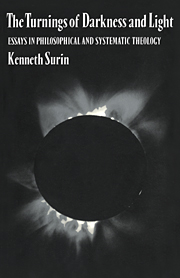Book contents
- Frontmatter
- Contents
- Dedication
- Preface
- Abbreviations
- 1 Creation, revelation and the analogy theory
- 2 The Trinity and philosophical reflection: a study of David Brown's The Divine Trinity
- 3 ‘Is it true what they say about “theological realism”?’
- 4 The impassibility of God and the problem of evil
- 5 Theodicy?
- 6 Tragedy and the soul's conquest of evil
- 7 Atonement and moral apocalypticism: William Styron's Sophie's Choice
- 8 Atonement and christology
- 9 Revelation, salvation, the uniqueness of Christ and other religions
- 10 ‘Many religions and the one true faith’: an examination of Lindbeck's chapter 3
- 11 Contemptus mundi and the disenchanted world: Bonhoeffer's ‘discipline of the secret’ and Adorno's ‘strategy of hibernation’
- 12 ‘The weight of weakness’: intratextuality and discipleship
- 13 ‘Theistic arguments’ and ‘rational theism’
- Notes
- Index of names
- Index of subjects
6 - Tragedy and the soul's conquest of evil
Published online by Cambridge University Press: 19 January 2010
- Frontmatter
- Contents
- Dedication
- Preface
- Abbreviations
- 1 Creation, revelation and the analogy theory
- 2 The Trinity and philosophical reflection: a study of David Brown's The Divine Trinity
- 3 ‘Is it true what they say about “theological realism”?’
- 4 The impassibility of God and the problem of evil
- 5 Theodicy?
- 6 Tragedy and the soul's conquest of evil
- 7 Atonement and moral apocalypticism: William Styron's Sophie's Choice
- 8 Atonement and christology
- 9 Revelation, salvation, the uniqueness of Christ and other religions
- 10 ‘Many religions and the one true faith’: an examination of Lindbeck's chapter 3
- 11 Contemptus mundi and the disenchanted world: Bonhoeffer's ‘discipline of the secret’ and Adorno's ‘strategy of hibernation’
- 12 ‘The weight of weakness’: intratextuality and discipleship
- 13 ‘Theistic arguments’ and ‘rational theism’
- Notes
- Index of names
- Index of subjects
Summary
In an interesting and important essay titled ‘The Soul's Conquest of Evil’, Professor W. W. Bartley III argues that it is virtually impossible for a person to subdue his or her own evil will. Bartley claims that it is a conditio sine qua non of the human conquest of evil that a person possesses self-knowledge, but he is pessimistic about the human capacity to gain the self-knowledge needed to triumph over an evil will. Bartley quotes with approval the words of C. G. Jung:
The individual who wishes to have an answer to the problem of evil, as it is posed today, has need, first and foremost, of self-knowledge, that is, the utmost possible knowledge of his own wholeness. He must know relentlessly how much good he can do, and what crimes he is capable of, and must beware of regarding the one as real and the other as illusion. Both are elements within his nature, and both are bound to come to light in him, should he wish – as he ought – to live without self-deception or self-delusion.
It is Bartley's contention that the search for self-knowledge is a costly and perilous venture, undertaken successfully by only a few exceptional individuals. Prima facie, what Bartley and Jung say seems to be not without plausibility; most of us find it hard to be good precisely because we fail to acquire that clarity of vision which is so important if we are to struggle successfully to be moral beings.
- Type
- Chapter
- Information
- The Turnings of Darkness and LightEssays in Philosophical and Systematic Theology, pp. 91 - 101Publisher: Cambridge University PressPrint publication year: 1989



